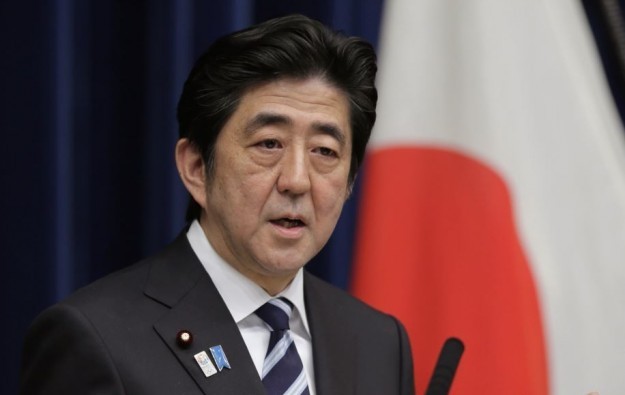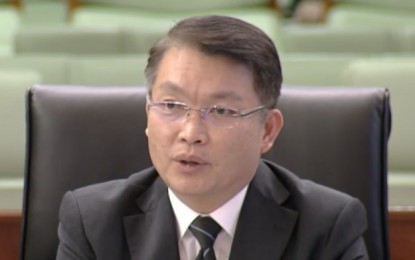Abe party Tokyo defeat hurts casino push: brokerage
Jul 05, 2017 Newsdesk Japan, Latest News, Top of the deck

Japan’s hopes of introducing a casino industry might have suffered a setback following a significant defeat for the governing Liberal Democratic Party (LDP) of Prime Minister Shinzo Abe (pictured) in Tokyo local elections, suggests a note from brokerage Union Gaming Securities Asia Ltd.
“We believe the Tokyo defeat for the LDP, and by implication a weaker outlook for the LDP nationally, will make it incrementally tougher for Prime Minister Abe to push through his agenda, including the very contentious IR [integrated resorts] issue,” said Wednesday’s note from Union Gaming.
The brokerage’s analyst Grant Govertsen stated: “In the now more likely event that the IR [implementation] bill doesn’t come to fruition this year (and possibly next year too) due to the LDP’s political fortunes, we would view this as a positive for the pachinko industry as it could result in a regulatory reprieve.”
Following Sunday’s poll for the Tokyo Metropolitan Assembly, Mr Abe’s LDP – previously the largest party in the 127-member assembly with 60 seats – was reduced to just 23. The LDP’s national coalition partner, Komeito, also secured 23 seats. Tomin First, the party of Tokyo’s sitting governor, Yuriko Koike, became the largest single party, with 49 seats.
Last year Ms Koike – who came to office in July 2016 – said in an interview she was in favour of a casino resort for Tokyo. But Bloomberg News reported in late May, ahead of this month’s Tokyo regional poll, that Ms Koike “hasn’t made casinos a priority”.
The Japan Times said in a Monday article: “History shows the outcome of the [Tokyo] assembly election often sways the direction of national politics. The LDP’s historic fall from power in August 2009, for example, was preceded by the Tokyo chapter’s crushing defeat in the assembly election just one-and-a-half months before.”
Under a best-case scenario, the IR Implementation Bill – on specifics including how casinos are administered and regulated – might be passed by the country’s parliament in the 2017 extraordinary session in the autumn, suggested a note in May from banking group Morgan Stanley.
Industry commentators have been divided on to what extent the pachinko industry – currently the biggest form of quasi-gambling leisure activity in Japan measured by money wagered – could gain or lose from the creation of a regulated casino industry. Some have pointed to casino regulation being accompanied by new regulation for pachinko – taking it out of its current hazy legal status – as being a plus for pachinko. Others see further regulation of pachinko as a negative, as existing caps on player payouts have already been attributed as causing a decline in parlour attendance. Yet other commentators have pointed to the possibility of pachinko operators becoming equity partners in casino projects.
Union Gaming covers the stock of Hong Kong-listed Japanese pachinko operator Dynam Japan Holdings Co Ltd.
Mr Govertsen stated in Wednesday’s note: “As the IR [implementation] bill has been moving forward and as the separate problem gaming bill has taken centre stage, we believe this has put additional pressure on the National Police Agency [the pachinko regulator] to keep pace in terms of making pachinko even more restrictive.”
Related articles
-
 Universal now expects FY2024 loss,...
Universal now expects FY2024 loss,...Nov 15, 2024
-
 Further Japan IR phase to play for amid...
Further Japan IR phase to play for amid...Oct 31, 2024
More news
-
 Macau to get 36mln visitors in 2025:...
Macau to get 36mln visitors in 2025:...Nov 21, 2024
-
 Star Entertainment clinches US$130mln...
Star Entertainment clinches US$130mln...Nov 21, 2024
Latest News
Nov 21, 2024
Macau’s 2025 visitor tally could reach 36 million, or a circa 9-percent gain on this year’s projected 33 million. So said Lei Wai Nong (pictured in a file photo), the city’s Secretary for...Sign up to our FREE Newsletter
 (Click here for more)
(Click here for more)
Pick of the Day
”As we navigate the final steps of the licensing process, we remain confident in our ability to align with Brazil’s regulatory requirements”
Eusebio Tanco
Chairman of DigiPlus Interactive
Most Popular
 Gaming technology firm IGT reports hacking incident November 21, 2024
Gaming technology firm IGT reports hacking incident November 21, 2024  US$30bln 2025 GGR target achievable for Macau: CE November 19, 2024
US$30bln 2025 GGR target achievable for Macau: CE November 19, 2024  Marina Bay Sands projects 40pct EBITDA leap post extension November 20, 2024
Marina Bay Sands projects 40pct EBITDA leap post extension November 20, 2024  Macau big-event outdoor venue gets trial run Dec 28: CE November 20, 2024
Macau big-event outdoor venue gets trial run Dec 28: CE November 20, 2024  Future of gaming is the online format: Pagcor chairman November 20, 2024
Future of gaming is the online format: Pagcor chairman November 20, 2024









